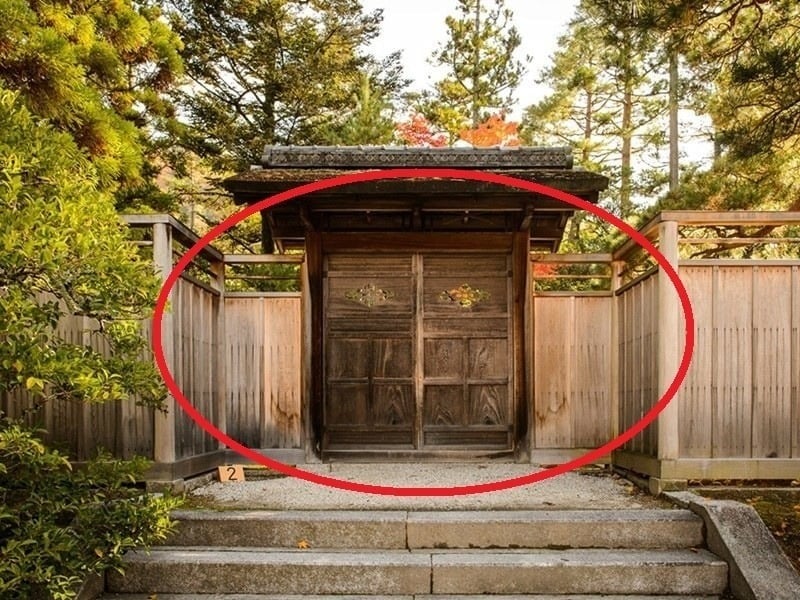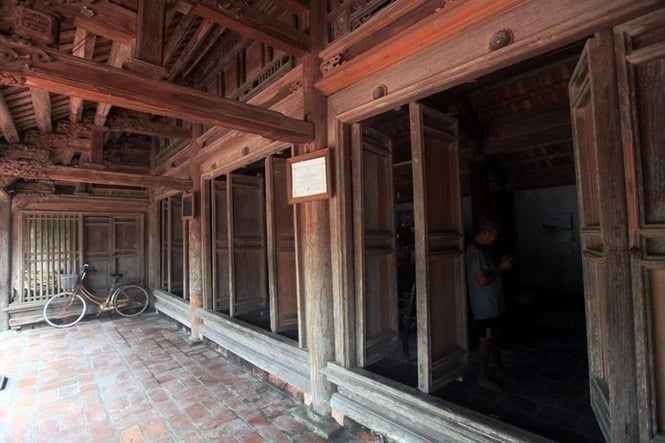The placement of the main door is a crucial factor in residential construction. When designing a house, homeowners should consult with Feng Shui experts to determine the optimal location for the main door to attract wealth and foster the family’s prosperity.
According to traditional Feng Shui principles, having two large doors or gates is generally discouraged as it is believed to lead to financial and fortune dispersal.
Moreover, in classical Feng Shui, older houses often had smaller back or side doors leading outside. These were not considered the main entrance but rather served as auxiliary doors to regulate airflow and ensure the retention of wealth and good fortune.
How to Determine the Main Door in a House with Two Entrances?
The determination of the main door in a house should be based on the function and significance of each entrance. There are two important cases to distinguish:
Two Similar Main Doors
When a house has two main doors of similar size, purpose, and design, identifying which one is the main entrance can be challenging. In this scenario, if both doors serve as primary entryways and are equally grand and impressive, it creates ambiguity in distinguishing between the main and auxiliary doors.

The challenge of determining the main door when two entrances are similarly designed and sized.
Two Distinctive Doors
In contrast, when a house has two entrances but they differ significantly in size and function, it becomes easier to establish which is the main door. Typically, the largest door, used for welcoming guests, and positioned for easy access from the main road, is considered the main entrance. The auxiliary door, on the other hand, may be smaller and used for more private or specific purposes, such as household chores.
Feng Shui principles dictate that a house should ideally have one main door to avoid potential negative impacts on the family’s wealth and luck. Homeowners should clearly distinguish between the main and auxiliary doors to prevent any adverse effects.
Understanding the Classical and Modern Perspectives on Houses with Two Main Doors
Classical Perspective
Traditionally, having two main doors in a house was believed to signify disharmony within the family. One door for entering and another for exiting symbolized differences and a lack of harmony in family relationships. In families with conflicts, individuals might choose to use separate doors to avoid encountering each other, thus reducing interpersonal tension.
However, this solution is temporary and may exacerbate conflicts instead of fostering long-term resolution. Ancestors valued family harmony and warmth as essential prerequisites for happiness and prosperity. Therefore, prolonged familial discord would hinder the possibility of achieving lasting growth and success.

The traditional perspective associates two main doors with familial disharmony.
Modern Perspective
The modern approach is grounded in scientific and theoretical principles. Ancients believed that having two main doors could facilitate theft. Intruders could easily find an escape route through another door, increasing the risk of loss of property and personal safety.
If the house is unguarded or vacant, burglary becomes more feasible. Hence, the ancient advice against constructing two main doors, even with the presence of auxiliary doors, remains valuable and applicable in modern contexts, underscoring the importance of security and theft prevention.
Remedies for Houses with Two Main Doors
Curtains and Room Dividers
Using curtains or room dividers are simple yet effective methods to mitigate the negative impact of two interconnected doors. Curtains help prevent the dissipation of positive energy, while room dividers create an invisible barrier, reducing the connection between the two doors.
Polyhedral Balls and Five-Emperor Coins
Polyhedral balls and Five-Emperor coins are useful Feng Shui remedies. After being consecrated, the coins can be placed with the polyhedral balls near the doors to regulate energy flow and enhance Feng Shui stability.
Three Gods of Fortune or Dragon Turtle Statues
To counteract the negative influence of two interconnected doors, homeowners can place statues of the Three Gods of Fortune or a Dragon Turtle behind the doors. These symbols are believed to ward off negative energies and bring peace and prosperity to the household.
The Secret to a Prosperous Home: Unveiling the Myth Behind the Jackfruit Tree
The jackfruit tree is a majestic and fruitful tree, revered for its delicious fruit and beautiful timber. However, in the past, people were averse to planting jackfruit trees in front of their houses. This reluctance stemmed from a belief that the tree’s strong presence and deep roots could bring bad luck and cause an imbalance in the harmony of the home. Superstitions aside, the jackfruit tree is a magnificent addition to any landscape, offering shade, beauty, and an abundance of sweet, nutritious fruit.
Title: “The Bald and the Beautiful: Unlocking the Secret to Wealth and Success”
In ancient times, a bald head was considered a sign of greatness, destined for a glorious future. But why was this the case? Uncover the fascinating history behind this unique belief and explore the cultural significance it holds. Delve into a world where baldness was not just a physical attribute but a symbol of power and success.




































